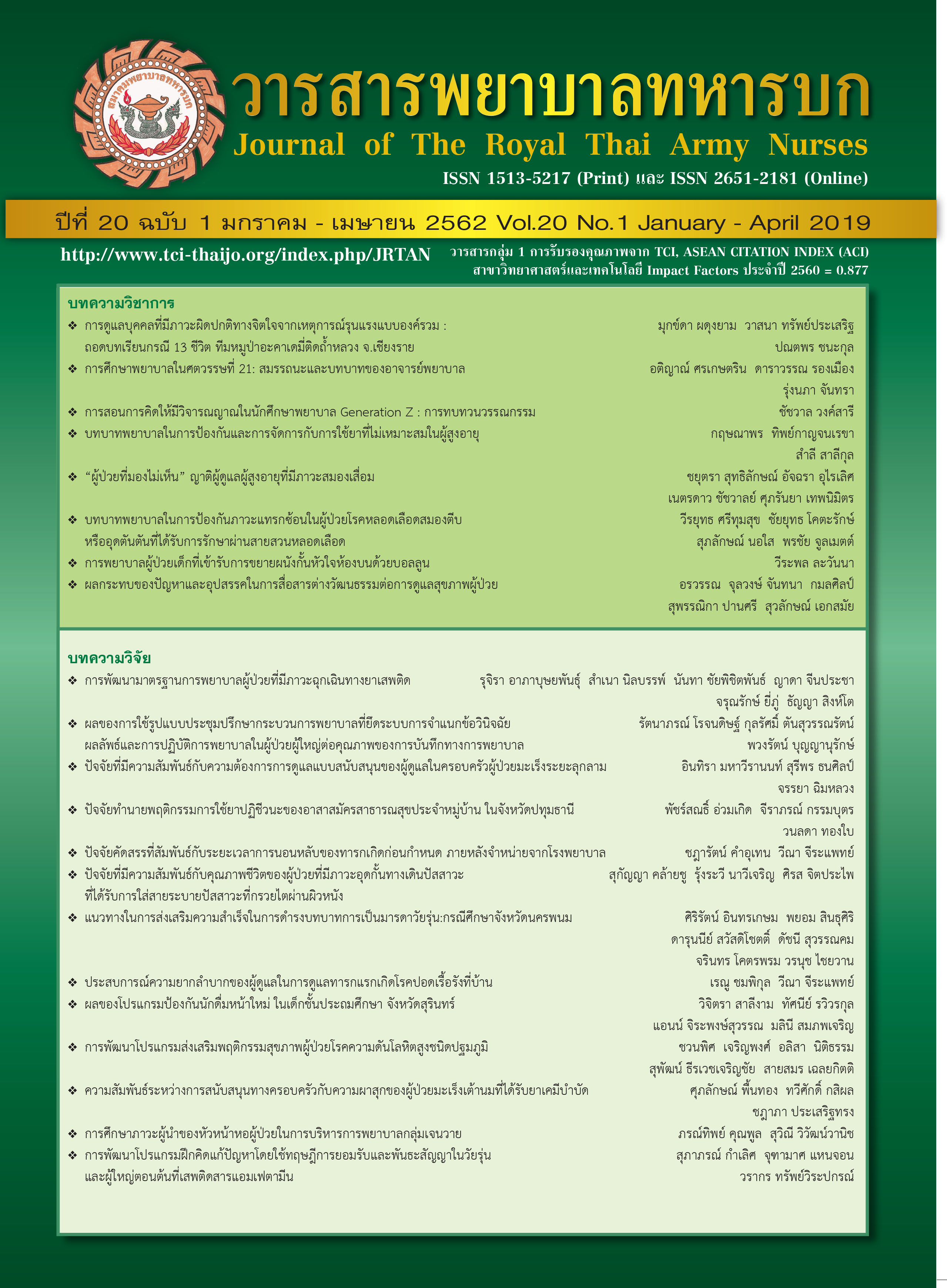A Development of Health Behavior Promotion Program of Primary Hypertensive Patients
Keywords:
Primary hypertension, Health Promotion Behavior, Hypertensive patientsAbstract
This quasi-experimental research two groups pretest-posttest design aimed to develop Health Promotion Behaviors Program of the primary hypertensive patients. The samples consisted of 60 female hypertensive patients attended at Health Promoting Hospital,Tum-bon Dong la-kon, Muang District, Nakhon Nayok. The samples were divided into two groups, 30 patients each. One group was experimental group and the other one was control group. The instrument used in this study was the Health Promotion behavior Program. Data were collection by using questionnaires of disease knowledge, self-efficacy, health believe model, social support and health behavior which verified for content validity by a panel of five experts. The reliability was presented at .93, .88, .93,.92and.94 respectively.Blood pressure was monitoring before and after implementing the program. Data were analyzed by Descriptive statistics,t-test and independent t-test. The results showed that after implementing the program, the experimental group had better average score than pre-test and control group and had lower blood pressure-level than pre-test and control group at statistically significant level of .05.
Downloads
References
Thai Hypertension society: Guidelines on the Treatment of Hypertension. Chiangmai: Trickthink Printing: 2015.
Bandura, A. Self-efficacy: Toward a unifying theory of behavior change. Psychological Reviews. 1997.
Becker, M.H. The Health Belief Model and Preventive Health Behavior. Health Education Monographs. 2, 4 winter: 354-385.
Schwarzer, R, & Leppin, A. Social Support and health: A theoretical and empirical overview. Journal of Social and Personal Relationships, 8,99 -127.1974.
Srisiri S. Effects of the self-efficacy of Health Behavior Program of elderly Hypertensive -patients. Master of Nursing Science[Thesis]. Naresuan University; 2013. (In Thai).
Kadkoserm T. Effects of the Health Believe Model of Health Behavior Program ofHypertensive -patients. Master of Nursing Science [Thesis]. Naresuan University; 2013. [in Thai].
Jamkrajang T, Boonjun M, Mala J. The Effectiveness of the Self-efficacy and Social support Enhancement Program on Medication adherence and Blood pressure among Hypertensive Elderly in Community. Journal of the Royal Thai Army Nurses. 2017; 18(1): 270-279. (in Thai).
Hoontrakul S, Somboontanont W. Developing self-care competency to prevent Complication in hypertensive clients in the community. Journal of the Royal Thai Army Nurses. 2012; 13(3): 38-46. (in Thai).
Downloads
Published
How to Cite
Issue
Section
License
บทความหรือข้อคิดเห็นใดใดที่ปรากฏในวารสารพยาบาลทหารบกเป็นวรรณกรรมของผู้เขียน ซึ่งบรรณาธิการหรือสมาคมพยาบาลทหารบก ไม่จำเป็นต้องเห็นด้วย
บทความที่ได้รับการตีพิมพ์เป็นลิขสิทธิ์ของวารสารพยาบาลทหารบก
The ideas and opinions expressed in the Journal of The Royal Thai Army Nurses are those of the authors and not necessarily those
of the editor or Royal Thai Army Nurses Association.






